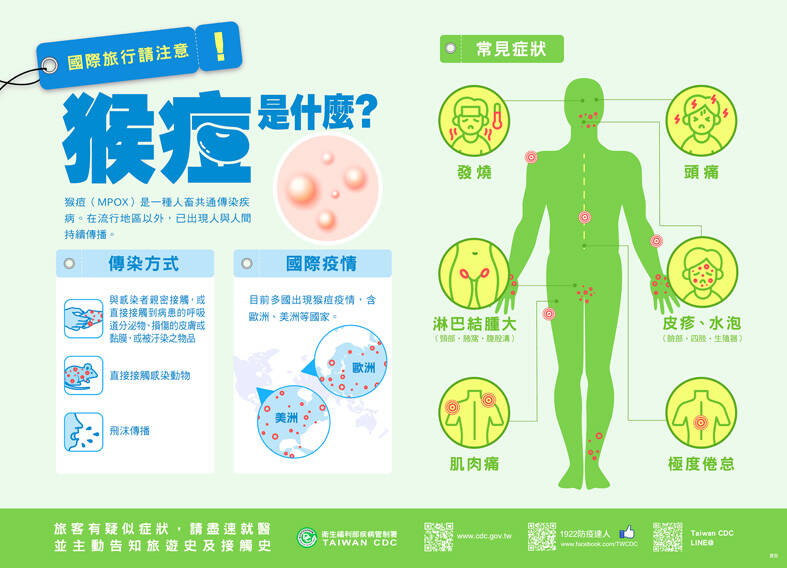Taiwan’s first two cases of locally acquired mpox (formerly known as monkeypox) were reported yesterday as the Centers for Disease Control (CDC) warned that the risk of local infection has increased.
CDC Epidemic Intelligence Center Deputy Director Guo Hung-wei (郭宏偉) said the two cases are a man in his 40s in Hsinchu and a man in his 20s in Kaohsiung.
They had symptoms including a fever, papules, blisters and swollen lymph nodes, and were diagnosed with mpox on Sunday and Monday, Guo said.

Graphic courtesy of the Centers for Disease Control
Neither man had traveled abroad recently, so they have been counted as local cases, Guo said, adding that since June 23 last year, when mpox was made a Category 2 notifiable communicable disease, seven cases have been reported, with the previous five cases being imported.
The global mpox situation has been slowing, with the WHO’s analysis of recent cases showing that the majority were young men, with 68.8 percent of transmission occurring through sexual contact.
The WHO on Feb. 15 said that mpox would remain a “public health emergency of international concern.”
The world health body in November last year said that following “a series of consultations with global experts, WHO will begin using a new preferred term ‘mpox’ as a synonym for monkeypox” and that “both names will be used simultaneously for one year while ‘monkeypox’ is phased out.”
CDC Deputy Director-General Philip Lo (羅一鈞) said that there were no connections found between the two local cases and 25 close contacts had been identified, including four family members and two intimate contacts.
The conditions of the two men would be monitored until March 20, Lo said.
CDC Division of Chronic Diseases head Chan Pei-chun (詹珮君) said that mpox is a viral zoonotic disease that has become more transmissible among humans than avian flu.
It is mainly spread through intimate contact with an infected person through bodily fluids, respiratory droplets, lesions or contaminated objects, Chan said.
Rashes often start on the face or genital area and can spread to other parts of the body, with phases including spots, blisters and scabbing, she said.
People with suspected mpox symptoms should wear a mask and wash their hands before seeking medical attention, she said, adding that they should inform their doctor about their recent travel history and contact with suspected cases.
As local cases have been reported, people should take extra precautions in high-risk locations, such as where they might have intimate contact with unfamiliar people, Chan said.
Asian nations, including Japan and Thailand, have also recently reported local mpox cases, suggesting that a rise in international travel as COVID-19 restrictions have been eased globally has allowed mpox to spread more easily across borders, Lo said.
The CDC would convene an expert panel to discuss a program of pre-exposure mpox vaccination and communicate with civic groups about prevention among high-risk groups.
Speaking on other health matters, Guo said that cases of infectious diseases reported last week included four new serious flu complications and a high level of diarrhea cases, while enterovirus cases are expected to gradually increase.

Seventy percent of middle and elementary schools now conduct English classes entirely in English, the Ministry of Education said, as it encourages schools nationwide to adopt this practice Minister of Education (MOE) Cheng Ying-yao (鄭英耀) is scheduled to present a report on the government’s bilingual education policy to the Legislative Yuan’s Education and Culture Committee today. The report would outline strategies aimed at expanding access to education, reducing regional disparities and improving talent cultivation. Implementation of bilingual education policies has varied across local governments, occasionally drawing public criticism. For example, some schools have required teachers of non-English subjects to pass English proficiency

‘FORM OF PROTEST’: The German Institute Taipei said it was ‘shocked’ to see Nazi symbolism used in connection with political aims as it condemned the incident Sung Chien-liang (宋建樑), who led efforts to recall Democratic Progressive Party (DPP) Legislator Lee Kun-cheng (李坤城), was released on bail of NT$80,000 yesterday amid an outcry over a Nazi armband he wore to questioning the night before. Sung arrived at the New Taipei City District Prosecutors’ Office for questioning in a recall petition forgery case on Tuesday night wearing a red armband bearing a swastika, carrying a copy of Adolf Hitler’s Mein Kampf and giving a Nazi salute. Sung left the building at 1:15am without the armband and apparently covering the book with a coat. This is a serious international scandal and Chinese

PERSONAL DATA: The implicated KMT members allegedly compiled their petitions by copying names from party lists without the consent of the people concerned Judicial authorities searched six locations yesterday and questioned six people, including one elderly Chinese Nationalist Party (KMT) member and five KMT Youth League associates, about alleged signature forgery and fraud relating to their recall efforts against two Democratic Progressive Party (DPP) legislators. After launching a probe into alleged signature forgery and related fraud in the KMT’s recall effort, prosecutors received a number of complaints, including about one petition that had 1,748 signatures of voters whose family members said they had already passed away, and also voters who said they did not approve the use of their name, Taipei Deputy Chief Prosecutor

TRADE: The premier pledged safeguards on ‘Made in Taiwan’ labeling, anti-dumping measures and stricter export controls to strengthen its position in trade talks Products labeled “made in Taiwan” must be genuinely made in Taiwan, Premier Cho Jung-tai (卓榮泰) said yesterday, vowing to enforce strict safeguards against “origin laundering” and initiate anti-dumping investigations to prevent China dumping its products in Taiwan. Cho made the remarks in a discussion session with representatives from industries in Kaohsiung. In response to the US government’s recent announcement of “reciprocal” tariffs on its trading partners, President William Lai (賴清德) and Cho last week began a series of consultations with industry leaders nationwide to gather feedback and address concerns. Taiwanese and US officials held a videoconference on Friday evening to discuss the